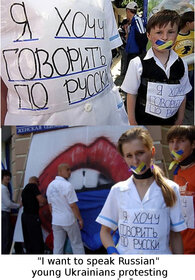In a quandary
Ukraine and the dilemma of Catalan separatists
March 5, 2022
The Catalan President Pere Aragonès of the separatist party ERC is in favour of supplying weapons to Kiev (Western) Ukraine and sees himself in agreement with the President of Spain, Pedro Sánchez.
There are three areas that have separated from Ukraine: Crimea and, in the Donbass, the Lugansk and Donetsk People's Republics. The two republics of the Donbass have been subjected to a brutal war by Kiev since their declaration of independence in 2014, which has already cost over 14,000 dead and civilians on both sides.
In 2017, all Catalan independence parties deplored the deployment of police to stop the illegal referendum for a declaration of independence of Catalonia, partly by force. Regrettably, there were a few casualties, which almost looks like a Hollywood movie brawl against the horror that has been going on for 8 years in the region of former Eastern Ukraine.
Independence from the Ukraine? NO! From Spain? YES! How does that fit together?
The right of self-determination of peoples
For three opinions on the law, two lawyers are usually enough. This is also the case with this question, which is not clearly regulated. Anyone who wants to can first go to Wikipedia and find out that this right to self-determination can in principle collide with the right to inviolability of state borders. In the case of allowing a referendum on Bavaria's withdrawal from Germany, the Federal Constitutional Court clearly ruled in 2016 that such a referendum would violate the constitutional order.
With regard to Catalonia, I personally essentially agree with what the UN Secretary General, Ban Ki Moon said about Catalonia in 2015. In response to the question: „Do you believe that the right to self-determination can be applied in this case?“ he replied: „Spain has remained a sovereign state, including Catalonia. When it comes to self-determination, there are certain areas where the United Nations has recognised this right, such as areas without self-government. But I don't think Catalonia falls into that category.“
Roughly speaking, one can advocate the right of a people to self-determination when they have no self-government and are oppressed. Wikipedia: There „is ... no norm of international law 'which would expressly affirm or prohibit a right of secession.'.... No right of secession can be derived even from state practice. Moreover, external self-determination and autonomy are to be granted and shaped on a case-by-case basis.
If the state discriminates against the minority striving for autonomy or even a state of its own through its exercise of power, it can forfeit its claim to territorial integrity under current international law.“
Catalonia
Catalonia has been part of the Spanish monarchy since the 15th century. Only from 1812 to 1814 was it part of the French Empire under Napoleon. Catalan autonomy granted in the Second Republic was revoked by Franco. From 1977, Catalonia again had autonomous status, confirmed by the adoption of the Spanish Constitution in 1978.
Catalonia is one of 17 autonomous communities in Spain. The Catalans are not discriminated against. Absurdly, it is rather the other way round. The mother tongue of the majority of Catalans is Spanish, (According to the linguistic census held by the Government of Catalonia in 2013, Spanish is the most spoken language in Catalonia {46.53% claim Spanish as „their own language“}) but the separatists in the Catalan government exert a language imposition on this majority for the use of the Catalan language. This goes so far that companies can be fined if they label their sales signs only in Spanish but not in Catalan. But not the other way round, so if the sales signs are only in Catalan but not in Spanish, there are no fines. In schools, parents are denied the right granted by the highest courts in Spain and Catalonia to have at least 25% of their children taught in Spanish.
Catalans have the same rights as all Spaniards of any nation or ethnic group. Millions of tourists feel they are treated the same in Barcelona as in Madrid, London or Paris. Only those who know Spanish are surprised that the Spanish language can be heard everywhere, but appears just as little in the city's writing as it does on traffic signs, official notices, etc.
Catalonia even has its own police force, the Mossos d'Esquadra.
The separatist dispute is basically a dispute about money. The separatists claim the right to independence only for themselves, but deny it to the Tabarnese. Tabarnia is the industrial region of Tarragona and Barcelona where various forces have announced that they will separate from Catalonia if Catalonia separates from Spain.
Ukraine and the Donbass
Kiev, the capital of Ukraine, is the birthplace of Russia („Kievan Rus“) in the 10th century. Ukraine was often under the rule of foreign monarchs, such as the Lithuanians, Poles and Habsburgs in ever-changing borders.
Tomas Röper explains, Ukraine today, like Spain, is a multi-ethnic state „whose borders were arbitrarily drawn by Lenin, Stalin and Khrushchev in the 1940s and 1950s according to the domestic political needs of the Soviet Union. The eastern territories of Ukraine, including the embattled Donbass, were and are almost one hundred per cent inhabited by Russians, and they were annexed to Ukraine after the October Revolution to counterbalance within the 'Ukrainian' part of the Soviet Union the Ukrainian peasants who were hostile to the revolution. The western territories of the country were added to Ukraine by Stalin after the war, when he moved the Soviet Union's border westwards at the expense of European countries. The Crimea was then also annexed to Ukraine by the Soviet General Secretary Khrushchev, who made his career in Ukraine, contrary to the rules of the Soviet constitution.“
Racism is unfortunately not an unknown phenomenon, as even Wikipedia admits. Not a few call the „Law on Indigenous Peoples“ of May 2021 a racial law. A few years ago, even the German magazine „Der Spiegel“ reported on voluntary neo-Nazi battalions like the „Azov“ in western Ukraine, which, as we know, are in the „best“ tradition of massacres of Jews. Dmytro Yarosh demanded a „de-Russification“ of Ukraine.
Kiev's language laws are not lacking in clarity either. They are similar to the language laws and the behaviour of the Catalan separatists. Everything Russian is to be banned. The only official language is Ukrainian, although a large minority in western Ukraine is also native Russian speakers. Between 30 and 40%, depending on the survey. When the last language law was passed in 2019, the German Foreign Office was still saying: „Together with France, we condemn the (Ukranian) language decree“. Of course, the Kiev laws go hand in hand with a transfiguring, extreme nationalism.
In contrast to the people who have regrettably only noticed since a few days ago with the Russian invasion that war after Yugoslavia has been raging in Europe again since 2014, I had already pointed out the warlike conditions on my blog in July 2019 under the title „Language impositions in the Ukraine“. Focusing on my topic of language impositions, I had pointed out that the constitutions of the two people's republics of Lugans and Donetsk, in contrast to Kiev, list Russian and Ukrainian as official languages, although Russian speakers are in the overwhelming majority there. Unfortunately, I could not and still cannot make any statements about the language reality in the separated republics; I know too little about them for that.
Not my dilemma
I started this blog in 2018 because I saw how my grandchildren in the Comunidad Valenciana have to suffer under the language imposition of the local government, which sets little or no limits to separatist influences from Catalonia. I have understood how language imposition and extreme nationalism go hand in hand in the interest of the few. Never in the interest of ordinary citizens, who only become victims of the conflicts thus fomented.
Of course, language imposition is not a cause of conflict, but a tool in the hands of those interested in conflict. In this respect, language imposition is a good, but by no means the only means of distinguishing between right and wrong.
This was already the case in South Africa, where the uprising against apartheid began in Soweto in 1976 with a bloody ended demonstration of the black people against the compulsory use of Afrikaans. Thousands of victims there and thousands of dead in Ukraine today. I am against language imposition and against war and I feel on the side of Western Ukrainian, Eastern Ukrainian and Russian victims.
The Catalan separatists must now explain how they want to justify supporting the Kiev government with weapons deliveries and the like against the separatists from the Donbass and the Russians who support them. What kind of message is that sending to Madrid? To send the military at the next illegal referendum to Catalonia? Shoot at Catalan towns and villages with artillery, just as NATO-backed Kiev is rampaging through the Donbass since 2014?
I do not support the US, NATO, the EU and Kiev, nor Moscow. I trust the governments involved as much as those in Madrid and Barcelona: not at all! The truth about this war is, as always, the first casualty. Both sides are only delivering propaganda at the moment. I don't fall for that and I'm not impressed. The refugees must be helped in any case.
| | | | Click here to subscribe or cancel your subscription |
Myths and deceptions of Catalan nationalism

Here you'll find the translation
The strategy of recatalanization
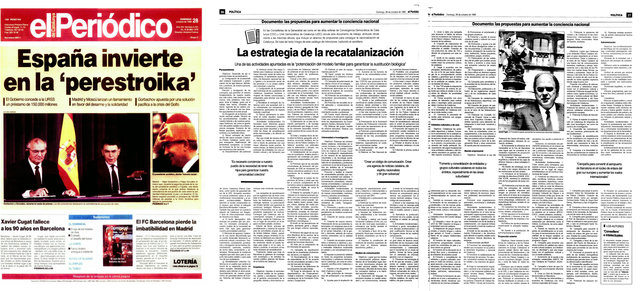 1980 the Spanish journal "El Periodico" published a secret document about the strategy of the Catalan government. It shows in a frightening way the actual spiritual world of the separatist leaders.
1980 the Spanish journal "El Periodico" published a secret document about the strategy of the Catalan government. It shows in a frightening way the actual spiritual world of the separatist leaders.Now it is available in english translation.
Pancatalanism
the separatist's imperial claim
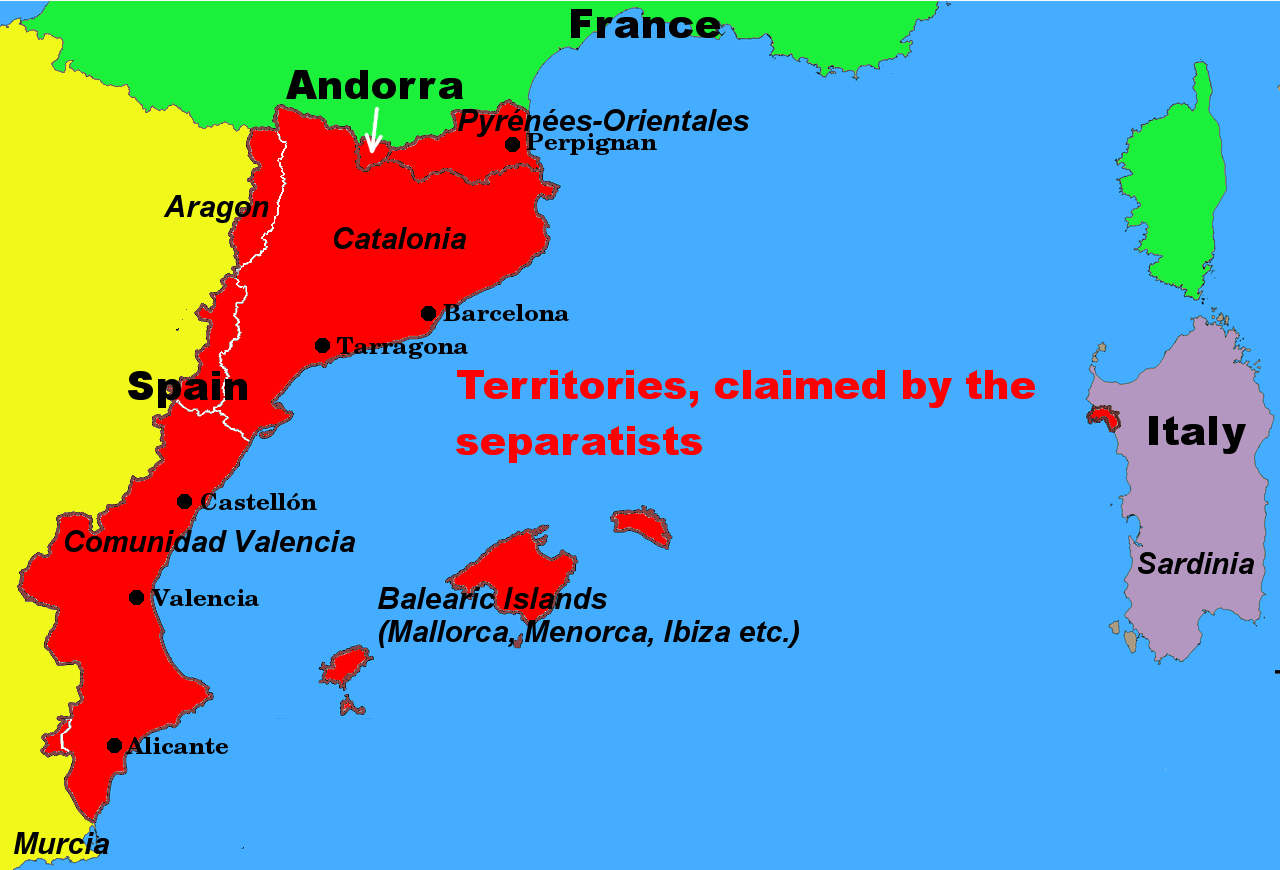 The Catalan government exports the conflict into communities with Catalan population, supporting all efforts of the separatists including financial means to destroy Spain.
The Catalan government exports the conflict into communities with Catalan population, supporting all efforts of the separatists including financial means to destroy Spain. An important tool is the establishment of a language dictatorship that is not afraid to use the same means as Franco.
Separatist indoctrination

Click here to read the study
Language imposition and democracy
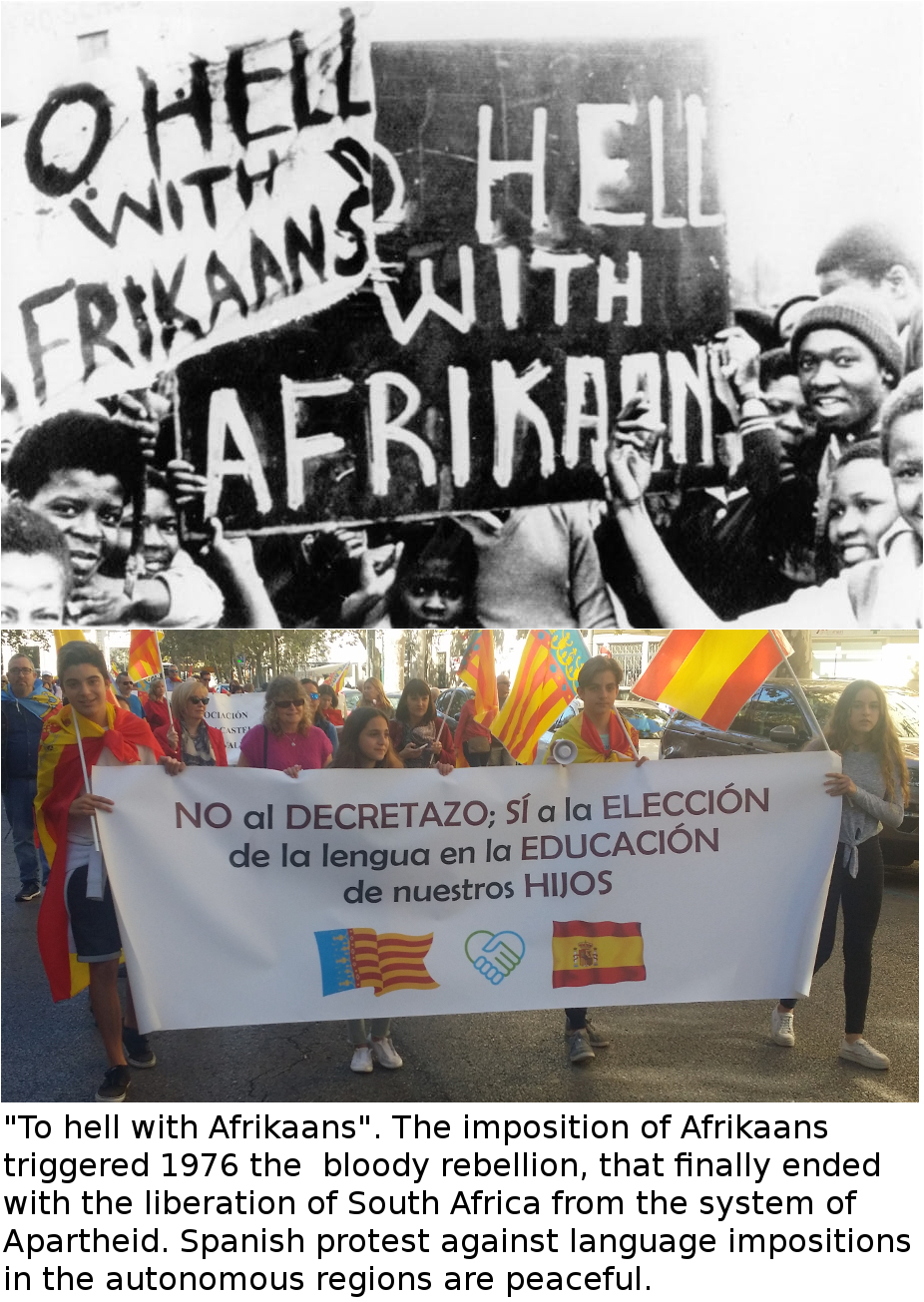
An essay in 6 parts on the potentially violent effect of language imposition containing contributions from South Africa, Catalonia, Ukraine and France.
go to part 1
Publications
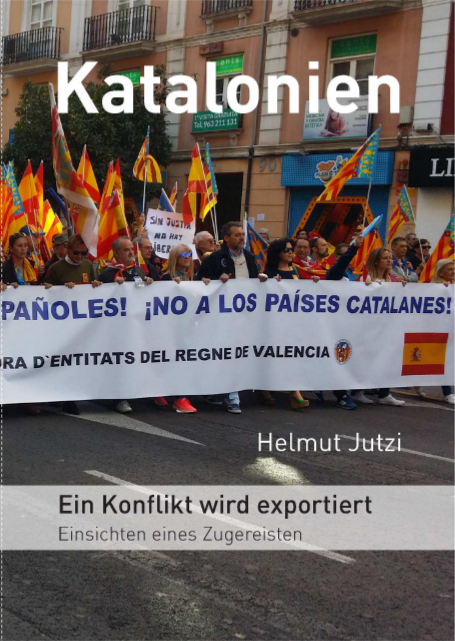 The title says: "Catalonia, a conflict is exported. Insights of a migrant"
The title says: "Catalonia, a conflict is exported. Insights of a migrant"Sorry, up to now, this book is only available in German. However, drop us a line, if you are interested to learn more Contact.
